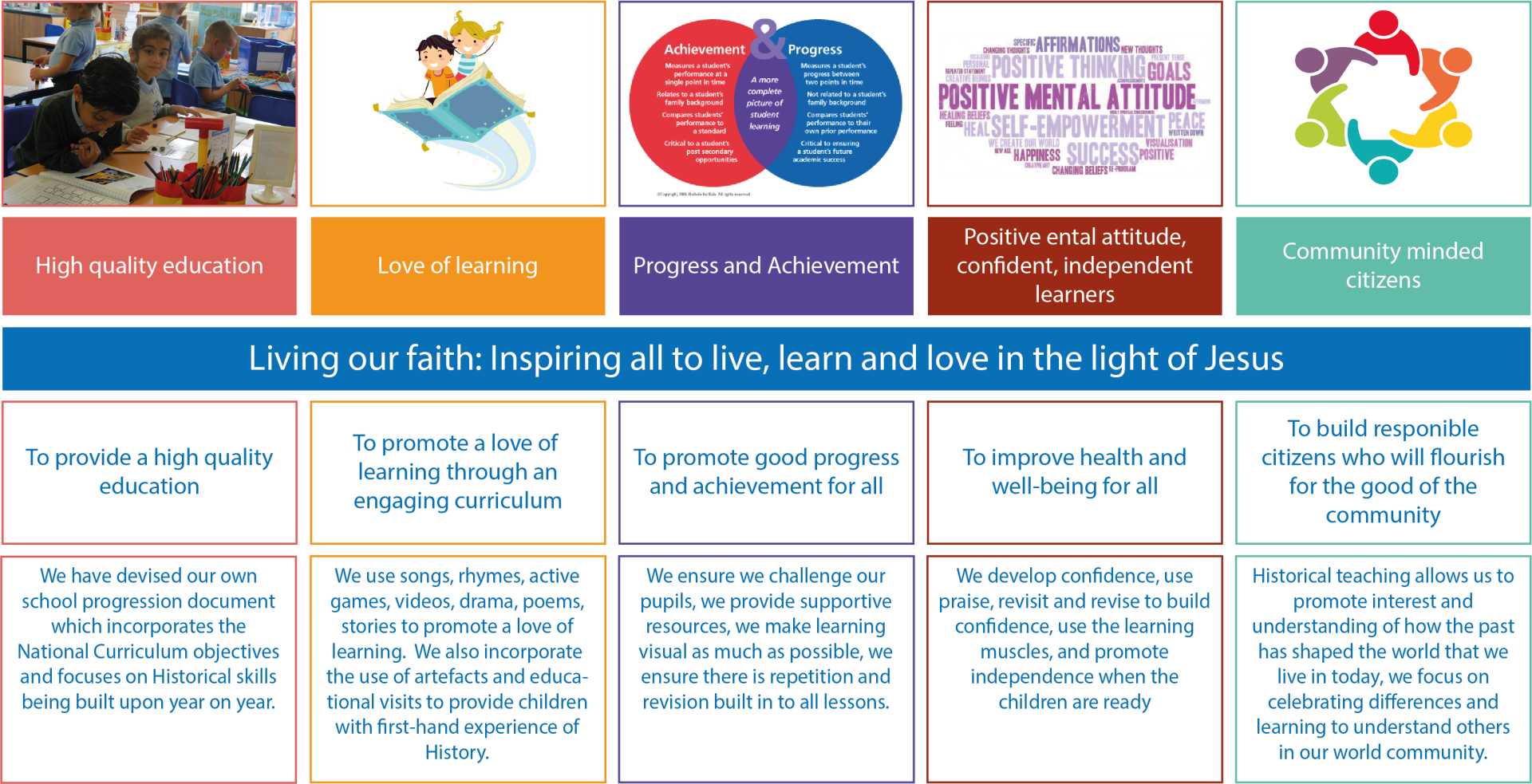St PaulinusCatholic Primary Academy
Inspiring all to live, learn and love in the light of Jesus
We are proud to work with all the Catholic schools across our two local authority areas, particularly as the Trust grows and benefits from the expertise and knowledge that other schools joining in the future will bring.
Visit UsAt St Paulinus History is taught across three half termly units through discreet and cross curricular teaching.

History is about real people who lived, and real events which happened in the past. History is concerned with sequence, time and chronology and is the study of evidence about the past; it gives us a sense of identity, set within our social, political, cultural and economic relationships. History fires the children’s curiosity about the past in Britain and the wider world and plays an essential part in preparing us for living and working in the contemporary world. Pupils consider how the past influences the present, what past societies were like, how these societies organised their politics, and what beliefs and cultures influenced people’s actions. As they do this, children develop a chronological framework for their knowledge of significant events and people. They see the diversity of human experience, and understand more about themselves as individuals and members of society. What they learn can influence their decisions about personal choices, attitudes and values. In history, children find evidence, weigh it up and reach their own conclusions. To do this they need to be able to research, sift through evidence, and argue for their point of view – skills that are prized in adult life.
In History, by the end of primary school, we aim for our children to:
We aim to develop these History skills:
History is a foundation subject of the National Curriculum. The fundamental skills, knowledge and concepts of the subject are set out in the programme of study for National Curriculum History. Here at St Paulinus Catholic Academy the children undertake a broad and balanced programme that takes account of abilities, aptitudes and physical, emotional and intellectual development. Through history the children learn a range of skills, concepts, attitudes and methods of working.
In the Early Years Unit, History is included in the Knowledge and Understanding of the World section of the Guidance for the Foundation Stage Document. This is used to form the basis of planning for teaching History in the Early Years. History is taught through child-initiated and adult-led activities. The children are given the opportunity to find out about past and present events in their own lives, and those of their families and other people they know. In Early Years History makes a significant contribution to developing a child’s understanding of the world through activities such as looking at pictures of famous people in history or discovering the meaning of new and old in relation to their own lives.
During Key Stage 1, pupils learn about people’s lives and lifestyles. They find out about significant men, women, children and events from the recent and more distant past in Britain and the wider world. They listen, and respond to stories and use sources of information to help them ask and answer questions. They learn how the past is different from the present.
During Key Stage 2 pupils learn about significant people, events and places from both recent and more distant past. They learn about change and continuity in their own area, in Britain and in other parts of the world. They look at history in a variety of ways, for example from political, economic, technological and scientific, social, religious, cultural or aesthetic perspectives. They use different sources of information to help them investigate the past both in-depth and in overview, using dates and historical vocabulary to describe events, people and developments. They also learn that the past can be represented and interpreted in different ways.
The predominant mode of working varies according to the age of the children and the nature of the activity in which they are engaged. Co-operative group work, individual work and class teaching are used as and when appropriate. Historical visits are also used as a resource for the teaching of History.
Children with Special Educational Needs affecting their progress in History are catered for in the classroom by their teachers through the use of differentiated material, scaffolding, pre-teaching and extra teaching time as appropriate.
Here at St Paulinus the progress of our children is measured using both formative and summative assessments. During lessons, staff use formative assessment to support and advise pupils in the moment. This allows teaching staff to assess whether pupils need further support or extending through more challenge. This also provides opportunity for pupils to follow advice, make improvements or develop their ideas at that exact moment in time. Summative assessment is used to assess each pupil, using assessment criteria developed in line with the scheme and the National Curriculum. This data is evaluated on a termly basis to evaluate any strengths or gaps in attainment. This informs future planning, and support is put in place for those that are not achieving in line with peers and increased challenge to further extend those that are exceeding expectations. Further information is gathered through pupil voice such as questionnaires and discussion. End of year assessments are carried out, identifying the level in which pupils are working. Planning is reflected upon throughout the year and is used to help guide planning for the consecutive year.

